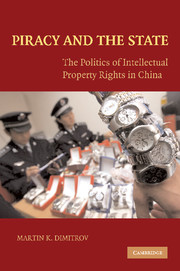Book contents
- Frontmatter
- Contents
- List of Tables
- List of Figures and GIS Maps
- Acknowledgments
- List of Abbreviations
- I INTRODUCTION
- II THE ORGANIZATION OF THE STATE: IPR ENFORCEMENT OPTIONS
- 3 Customs: Centralization without Rationalization
- 4 Courts: The Emergence of Rationalization
- 5 Administrative Enforcement: The Complex State
- 6 Criminal Enforcement: The Failure of Coordination
- III THE STATE IN ACTION: THE POLITICS OF IPR ENFORCEMENT IN CHINA
- IV CONCLUSION
- Glossary of Selected Chinese Terms
- Index
3 - Customs: Centralization without Rationalization
Published online by Cambridge University Press: 06 November 2009
- Frontmatter
- Contents
- List of Tables
- List of Figures and GIS Maps
- Acknowledgments
- List of Abbreviations
- I INTRODUCTION
- II THE ORGANIZATION OF THE STATE: IPR ENFORCEMENT OPTIONS
- 3 Customs: Centralization without Rationalization
- 4 Courts: The Emergence of Rationalization
- 5 Administrative Enforcement: The Complex State
- 6 Criminal Enforcement: The Failure of Coordination
- III THE STATE IN ACTION: THE POLITICS OF IPR ENFORCEMENT IN CHINA
- IV CONCLUSION
- Glossary of Selected Chinese Terms
- Index
Summary
Until his death in 2003, Tony Gurka's name was synonymous with one aspect of IPR enforcement. Long before anybody else knew that fighting piracy would itself become a booming industry, Gurka had opened a private firm in Hong Kong focusing on IPR investigations. His influence as a pioneer carries on: the majority of top investigators in Greater China today worked for him earlier in their careers. So when Tony agreed to see me in 2001, it felt as if I were being ushered into the center of things (and not just because I had to pass through six doors to get to his office).
I found Tony standing in front of a large map of China and North Korea. After briefly introducing my research, I jumped to my first question, about cigarette counterfeiting in China. “What you should know,” he said, “is that these days counterfeiting of top-end foreign brands is sometimes done in North Korea, not in China. All materials are Chinese, but the final assembly takes place at a factory in North Korea, and then the containers are shipped back to a Chinese port. In fact, there is a forty-foot container full of counterfeit Marlboros en route from Nampo to Dalian right now. We won't inform Chinese Customs about it – we will let this one go. But next time, when they send in a really big shipment, we will get them.” A forty-foot container, I thought, is not big enough?
- Type
- Chapter
- Information
- Piracy and the StateThe Politics of Intellectual Property Rights in China, pp. 71 - 94Publisher: Cambridge University PressPrint publication year: 2009

